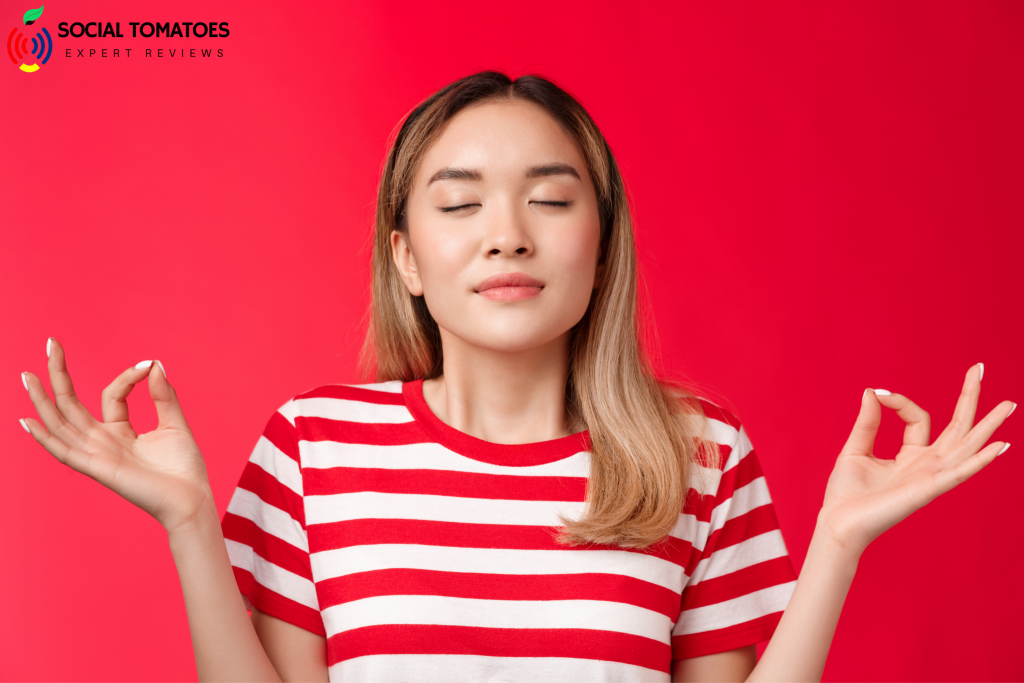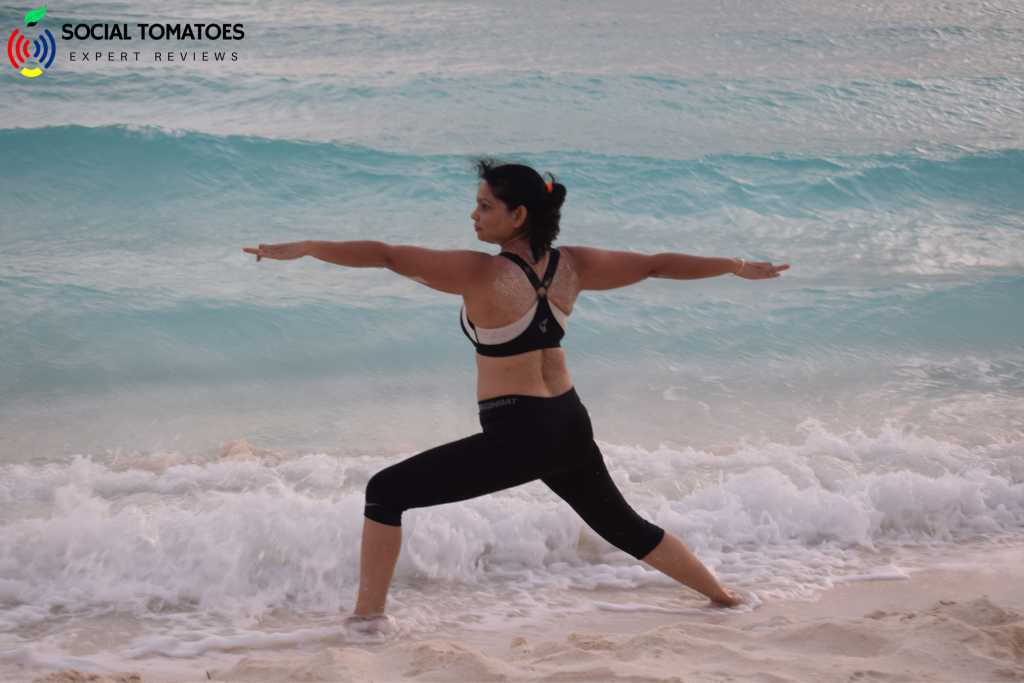Stress is a normal and healthy response to life’s challenges. A stress response is what permits our bodies to respond rapidly in an emergency and protect ourselves or others from harm. Fortunately, most days do not include an emergency, yet most of us still face stress regularly.
73% to 77% of people experience stress, which has a negative influence on their health. Approximately 77% of us! So, unless you are an unusually calm Zen master, you are most likely feeling bodily and mental pain due to stress right now.
When dealing with the long-term stress that most of us endure daily, our bodies were not designed to manage it. If you are worried that stress is damaging your health, see a doctor and begin applying relaxation methods right away.
In this blog, I will reveal the top 15 stress-relieving relaxation techniques.

15 Relaxation Tips For Stress:
1. Deep breathing:
Sit in a comfortable posture with your spine erect. Expand your abdomen by taking deep breaths through your nose. Continue to inhale deeply to fill the center of your lungs, causing your rib cage to expand.
Increase the size of your chest by taking deep breaths until you can feel the tops of your lungs filling up.
Then gently exhale through your lips, first feeling your upper chest drop, then your rib cage, and lastly drawing your abdomen up and towards your spine to empty the remaining air of your lower lungs.
Find your comfortable rhythm, ensuring that the exhale is slightly longer than the inhale.

2. Laugh Out Loud:
Laughter, without a doubt, is a treatment for reducing tension, anxiety, or even an unpleasant memory. You’re always with yourself, therefore you need to be the one who makes you happy so that you’ll enjoy your own company.
Life is full of anxieties, but you should concentrate on being happy and giving yourself some space. Try to enjoy your own company and laugh at joyful occasions. Begin recreating those incredible memories by recalling them.
There is a lot of evidence that laughing may help alleviate stress, and it’s true. Because of your laughter, you forget about the stress you had been under.
Laughter transports you to a universe where all of your joyful sensations are active and you are successfully relived.
3. Physical Exercise:
Physical exercise is essential for overall health and well-being. The body receives a signal that the danger has gone when it engages in physical activity. Our bodies are unaware that we have food shops, vehicles, even cell phones!
Our DNA has not evolved much in 100,000 years, which means that when it comes to stress, our bodies don’t recognize the difference between having our job endangered at work and being hunted by a saber-toothed cat!
If the brain persuades the body that it is at risk, the body prepares to fight or flee by releasing the catecholamines listed above into the circulation and organ systems.
It increases our bodies’ physical capabilities, thus it stands to reason that physical activity is the best approach to inform the body that it is no longer in danger!
Choose your favorite physical activity and make an effort to work up a sweat at least once a week. The health advantages are too many to ignore, and they are far too many to enumerate here.

4. Body Scan:
The majority of us disregard the cues our bodies provide us throughout the day. This ability allows you to swiftly check in with your body to make changes or gain critical information about your sensations.
The best approach to do a body scan is to shut your eyes while sitting or lying down. Take note of how your scalp and forehead feel, beginning at the top of your head.
Look in the mirror as you make your way to the bottom. Think about your body as a whole and connect with each part of it.
If you come across a tight spot, pause for a moment to take a soothing breath, relieve the tension, and then carry on till you reach your toes. This procedure might take as little or as much time as you like.
5. Music Therapy:
When you sense tension coming at you from all sides, listen to music. Instead of listening to loud, pop, or rap music, listen to melodic voices. Anything, either it is music or the complete song may make you feel relaxed.
We’ve all heard that listening to loud music might cause tension or headaches. So it’s preferable to listen to soothing music and attempt to divert your attention away from what’s bothering you.
However, in rare extreme circumstances, if loud rock rhythms connect with your pleasant sensations, you may choose that as well.
Even if you’re at work and feeling stressed, listen to music. Put your headphones in and start listening when you need a rest. Music songs are very peaceful and may instantly de-stress you by transporting you to another planet.

6. Progressive Muscle Relaxation:
This approach focuses on gradually tightening and releasing muscular groups. Deep breathing and guided visualization may use in combination with it.
After you’ve found a place to sit or lay down that feels relaxing, take a few deep breaths and close your eyes. Inhale and exhale by contracting and extending your stomach.
Tense and hold each muscle group for approximately 5 seconds, then relax for 30 seconds, then repeat.
Tensing certain muscle regions while including breath exercises may, once again, induce a feeling of peace and relaxation.
Before beginning progressive muscle relaxation treatment, see your doctor if you have heart trouble.
7. Visualization:
Visualization is one of the finest anxiety-reduction treatments since it can be done anywhere and at any time. Sit down and shut your eyes.
Consider imagining a peaceful location. It may be a childhood haunt, a clearing in the woods, a beloved nature preserve, a beach, or your favorite camping location.
Focus your concentrate on making the picture as clear as possible as you recall it. What details do you notice? You may even take the visualization a step further by searching for objects that affect the senses.
What would you be able to smell, hear, touch, taste, or see if you were really at this location? Focusing on these aspects can help you see the picture more clearly and concentrate your attention.
8. Meditation:
The amazing thing about meditation is that it helps you to “let go” of daily anxieties and actually “live in the now.” People who meditate daily claim physical, mental, and spiritual advantages, and they use it as a tool to not the only battle but also avoid stress in the first place.
To begin a meditation practice, choose a peaceful place away from the phone, television, friends, family, and other distractions. Breathing and mantra methods are often taught as part of meditation practices.
When you first begin meditating, your thoughts may wander, but by teaching your mind to concentrate on the present moment, you will feel more comfortable and in control. The majority of specialists advocate meditation for 20 to 30 minutes at a time.
Beginners may struggle to meditate for this duration at first, but don’t give up. It will get easier if you start meditating daily.

9. Relaxing Bath Or Shower:
I don’t know many individuals who don’t like a soothing, warm bath or shower. Aromatherapy might be a great option at this point.
The skin is the biggest organ in the human body, and what occurs on the skin’s surface may have a significant impact on what happens underneath, such as boosting blood circulation, decreasing muscular tension, burning calories, and even lowering blood sugar.
Aromatherapy is also a very effective relaxing method that you may utilize in stressful circumstances. The floral-scented ylang-ylang is very relaxing.
Breathing a mix of lavender, ylang-ylang, and bergamot was highly useful in decreasing anxiety and stress levels. Relaxation methods may help you decrease your heart rate, blood pressure, and serum cortisol levels.
Lavender, lemon or yuzu, bergamot, Ylang-Ylang, Clary Sage, and jasmine are some of the oils utilized in aromatherapy-related relaxation practices.
10. Yoga and Tai Chi:
These low-intensity exercises are comparable to each other and have been practiced for thousands of years. Both incorporate physical and “meditative” motions to reduce stress and blood pressure.
Yoga includes a wide range of postures that both stretch and strengthen the body. As you do each pose, you stay motionless and concentrate on your breathing.
Tai chi characterizes by slow, beautiful motions, similar to those of dance. As you shift your weight from one posture to the next, you’ll take deep breaths and focus on your body.
Depending on your physical ability, you can execute both exercises while sitting on a chair, however tai chi is generally done standing.
Before you begin yoga, it’s a good idea to locate a qualified expert who can teach you the fundamental poses and whatever kind of yoga is ideal for you.

11. Self-Massage:
The majority of individuals agree that massage helps them relax. Many of the benefits of a professional massage may achieve just by touching your own body. Self-massage is simple and maybe a terrific way to unwind.
This anxiety relaxation method is fantastic, particularly at the end of a hard day or when you’re trying to go to sleep at night.
Massage your neck and shoulders to get the blood flowing. Work the stiff muscles with your fists, then massage your neck up to the base of your head with your fingertip. Your face may massage with your fingers at this point, as well.
12. Have Fun:
Yes, not all of these relaxation techniques must be clinical and practiced. Friends and family may help alleviate your tension and worry.
They don’t make time for it because they don’t grasp the value of fun for both physical and mental health, and they don’t prioritize it in their busy schedules.
13. Walking Breaks:
When you’re feeling pressured, take 10-minute pauses to go for a stroll. Walking increases endorphins, which help lower stress hormones and relieve moderate sadness.
To walk, you must utilize both your arms and legs simultaneously. Relaxation may be a great benefit when done carefully. Instead of concentrating on your ideas, pay attention to your limb sensations and how your breathing complements your motions.
Make sure you’re performing some deep breathing while you’re walking. If at all feasible, try to stroll in nature, such as at a local park.
It’s hard to overstate the calming effects of being outside in nature, both on the body and the mind. This also has the additional advantage of providing some vitamin D from the sun.
You may even phone a friend or family member after your stroll. Even for a little moment, a comforting voice might help put things into perspective.

14. Express Gratitude And Appreciation:
Individuals are substantially happier when they express thanks or appreciation for the little things in life daily. Using a coping strategy called Three Good Things is a simple method to get this factor going.
To do Three Good Things, think, speak, or write three good things that are happening in your life right now. At first glance, it may seem to be the smallest, most insignificant component of your existence.
You’ll notice an improvement in your mood if you apply the Three Good Things coping strategy regularly.
When doing Three Good Things, it is also crucial not to be snarky or cynical. Don’t undermine or reject the wonderful things until you’ve established this positive habit.
15. Getting Help:
These anxiety calming strategies may not be sufficient for some persons. To conquer and reduce your anxiety, you may need further treatment approaches such as drugs, cognitive behavioral therapy, or other forms of psychotherapy.
Contacting a therapist is often the first step in permanently overcoming your anxiety. Depression and anxiety sufferers may benefit from internet therapy.
One research, for example, discovered that online therapy was even more beneficial than typical in-person sessions, with 100% of participants in the online group reporting continuing symptom reduction three months following treatment.
Individuals in the face-to-face group, on the other hand, had “significantly increased depressed symptoms” during the same period. This research compares internet-based treatment to traditional face-to-face therapy.

Frequently Asked Questions (FAQs):
1. Is There A Way To Lessen Stress, And If So, How?
Stress is our body’s response to adversity, and it manifests itself in many ways. It is often triggered when we encounter something novel, unexpected, or threatening to our sense of self, or when we believe we have little control over a situation.
2. What Exactly Are Relaxation Strategies?
Stress from everyday life, as well as stress-related to medical issues like heart disease and pain, may both benefit from relaxation techniques.
Regardless of whether your stress is out of control or you already have it under control, learning relaxation strategies may be beneficial to you. It is simple to learn basic relaxation methods.
3. How Do You Deal With Stress?
To alleviate stress, you might use a variety of relaxation techniques. Relaxation methods may help you experience a better quality of life and minimize stress symptoms, particularly if you have an illness.
Consider self-relaxation techniques that you may practice at home. Relaxation methods are an excellent strategy to aid with stress management.
4. How Can Relaxing Aid With Stress Management?
Relaxation methods are an excellent strategy to aid with stress management. There is more to relaxation than merely having fun or doing something you like. Reducing stress on the mind and body may be done via relaxation.
Conclusion:
Relaxation techniques may be used if you are suffering stress as a consequence of a circumstance. Allow yourself 20 minutes to calm your body.
If, after attempting all of these relaxing methods, you are still unable to cut it, see a doctor. Stress may be damaging if it is neglected or not handled for an extended period. As a result, it is the initial step in a sequence of disorders that might ultimately end your life.
As a result, we urge that you begin working on stress reduction as soon as possible by using the relaxation methods indicated above.


